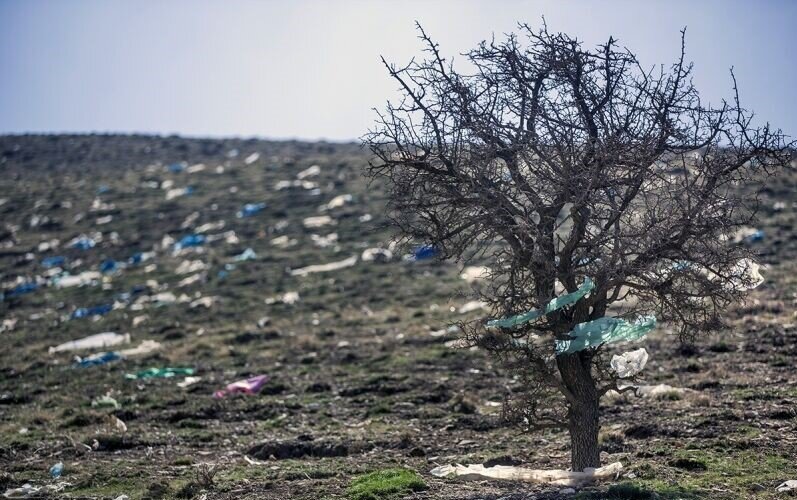Save the planet: Iran takes step to reduce plastic bags

TEHRAN – In Iran, over 1 million tons of plastic bags are produced annually, while its shelf life is less than 10 minutes, but they remain in nature for hundreds of years. Fortunately, the Department of Environment has drafted a bill and sent it to the government for approval to reduce the consumption of plastic bags.
For several years now, plastic forests have been growing all over the country, don't be surprised; You got it right; Plastic forests; if you get in the car and hit the road, you can see these forests wherever, the trees and bushes are covered with plastic that has been abandoned by tourists in nature, which creates both visual and environmental pollution. These forests are masterpieces of humanity.
Plastic bags were first invented by Alexander Parks in 1856, and in a short time, they were able to expand their territory to the rest of the world and have many devastating effects. The world has certainly been affected, so the United Nations has designated July 11, 1974, as World Plastic Day, to be a flip for countries to reduce the production and consumption of plastic bags.
The average lifespan of each plastic bag is less than 10 minutes, while remains between 100 and 500 years in nature, statistics show that 1 million plastic bags and 5 trillion disposable plastic bags are used in the world every minute.
According to research conducted in Iran, 3,000 tons per day and over one million tons of plastic bags are produced annually, although these figures are approximate, it is very thought-provoking.
In recent years, many countries have banned the production and consumption of plastics, including Bangladesh in 2002, Bhutan in 2007, Hong Kong in 2007, as well as the UK, and instead reusable and recyclable bags were sold.
Ireland, Taiwan, Italy, Switzerland, Germany, the Netherlands, and Belgium are also seeking to impose heavy taxes and stop the production of plastic bags, or have done so, but how about Iran?
Take ‘employment’ into account
Payam Joharchi, head waste management office at the DOE, told IRNA on Friday that because Iran is an oil-rich country and the raw materials for the production of plastic bags are abundantly available, there is also the issue of employment, so it must be carefully planned.
“Therefore, in the bill to reduce the consumption of plastic bags, which is mentioned in 6 articles, we focused more on incentive issues such as tax exemptions and suggested that the production of plastic bags be reduced by at least 20 percent annually or towards the production of renewable bags, given the importance of the issue of employment, it is planned to happen in six years,” he added.
Emphasizing that culture promotion is very important in changing the pattern of public behavior in consuming plastic bags, he said that manufacturing units cannot be closed, but their raw materials must be changed to renewables in the next 5 to 6 years.
“Another issue with plastic bags is the number of microns in production, which means that the lower the microns, the more they move. Now, if we raise the standard that is also included in the bill, for example, production below 50 microns is prohibited, then its weight will increase and it will not be easily moved, its shelf life will increase and will not be disposable anymore, because recycling bags with 80 or 100 microns may be affordable.
In the reduction and production of plastic bags, we came to the conclusion that we should focus on the destination, i.e. consumers, which can be reduced by cultural work, and people will be more directed to fabric bags.
We do not want to harm the people’s employment and business, we have proposed to reduce production and change the approach over a period of 6 years,” he concluded.
FB/MG

Leave a Comment